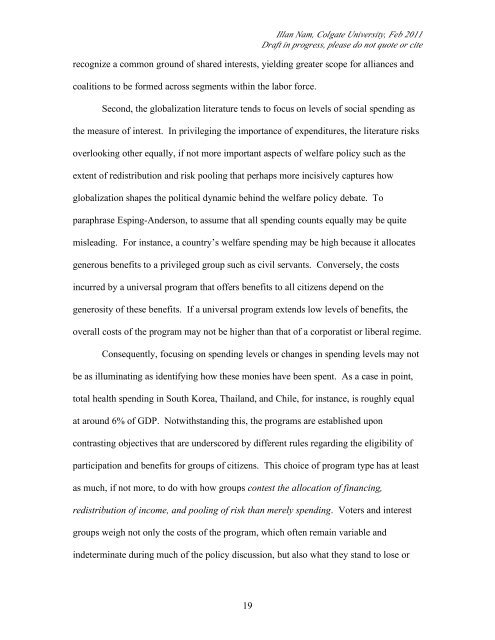Divergent Trajectories: Healthcare Insurance Reforms in East Asia ...
Divergent Trajectories: Healthcare Insurance Reforms in East Asia ...
Divergent Trajectories: Healthcare Insurance Reforms in East Asia ...
Create successful ePaper yourself
Turn your PDF publications into a flip-book with our unique Google optimized e-Paper software.
Illan Nam, Colgate University, Feb 2011Draft <strong>in</strong> progress, please do not quote or citerecognize a common ground of shared <strong>in</strong>terests, yield<strong>in</strong>g greater scope for alliances andcoalitions to be formed across segments with<strong>in</strong> the labor force.Second, the globalization literature tends to focus on levels of social spend<strong>in</strong>g asthe measure of <strong>in</strong>terest. In privileg<strong>in</strong>g the importance of expenditures, the literature risksoverlook<strong>in</strong>g other equally, if not more important aspects of welfare policy such as theextent of redistribution and risk pool<strong>in</strong>g that perhaps more <strong>in</strong>cisively captures howglobalization shapes the political dynamic beh<strong>in</strong>d the welfare policy debate. Toparaphrase Esp<strong>in</strong>g-Anderson, to assume that all spend<strong>in</strong>g counts equally may be quitemislead<strong>in</strong>g. For <strong>in</strong>stance, a country’s welfare spend<strong>in</strong>g may be high because it allocatesgenerous benefits to a privileged group such as civil servants. Conversely, the costs<strong>in</strong>curred by a universal program that offers benefits to all citizens depend on thegenerosity of these benefits. If a universal program extends low levels of benefits, theoverall costs of the program may not be higher than that of a corporatist or liberal regime.Consequently, focus<strong>in</strong>g on spend<strong>in</strong>g levels or changes <strong>in</strong> spend<strong>in</strong>g levels may notbe as illum<strong>in</strong>at<strong>in</strong>g as identify<strong>in</strong>g how these monies have been spent. As a case <strong>in</strong> po<strong>in</strong>t,total health spend<strong>in</strong>g <strong>in</strong> South Korea, Thailand, and Chile, for <strong>in</strong>stance, is roughly equalat around 6% of GDP. Notwithstand<strong>in</strong>g this, the programs are established uponcontrast<strong>in</strong>g objectives that are underscored by different rules regard<strong>in</strong>g the eligibility ofparticipation and benefits for groups of citizens. This choice of program type has at leastas much, if not more, to do with how groups contest the allocation of f<strong>in</strong>anc<strong>in</strong>g,redistribution of <strong>in</strong>come, and pool<strong>in</strong>g of risk than merely spend<strong>in</strong>g. Voters and <strong>in</strong>terestgroups weigh not only the costs of the program, which often rema<strong>in</strong> variable and<strong>in</strong>determ<strong>in</strong>ate dur<strong>in</strong>g much of the policy discussion, but also what they stand to lose or19













